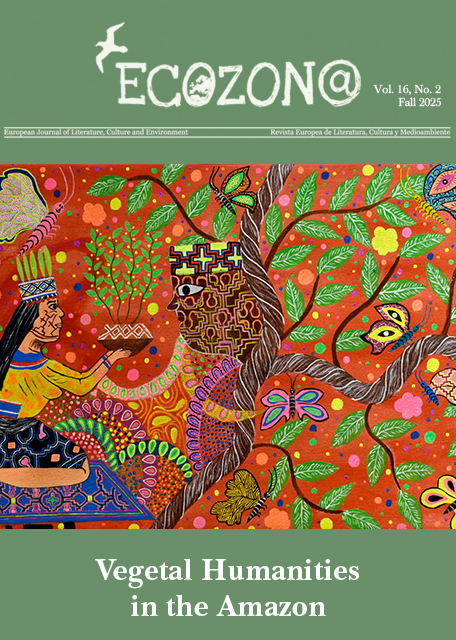Rooted Resistance and Vegetal Life in the Poetry of Ana Varela Tafur
DOI:
https://doi.org/10.37536/ECOZONA.2025.16.2.5870Parole chiave:
Ana Varela Tafur, Amazonian poetry, Peruvian poetry, Rubber Era, plant-thinking, interconnectedness, vegetal lifeAbstract
This article explores the vegetal imagery in Ana Varela Tafur’s poetry and how it engages with the legacy of colonial violence left by the Rubber Boom—violence that persists in contemporary extractive activities in the Peruvian Amazon. Through an analysis of three recurring plants in her work—the rubber tree, the Ayahuasca vine, and the shihuahuaco tree—I examine how each offers a distinct perspective on human–nonhuman relationships, the enduring cycles of exploitation that shape the region, and the potential of plant life to resist, heal, and foster ecological and cultural regeneration.
Downloads
##submission.downloads##
Pubblicato
Fascicolo
Sezione
Licenza
Authors who publish with this journal agree to the following terms:
a) Authors retain copyright and grant the journal right of first publication with the work simultaneously licensed under a Creative Commons Attribution License that allows others to share the work with an acknowledgement of the work's authorship and initial publication in this journal (CC BY-NC for articles and CC BY-NC-ND for creative work, unless author requests otherwise.
b) Authors are able to enter into separate, additional contractual arrangements for the non-exclusive distribution of the journal's published version of the work (e.g., post it to an institutional repository or publish it in a book), with an acknowledgement of its initial publication in this journal.
c) Authors are permitted and encouraged to post their work online (e.g., in institutional repositories or on their website) prior to and during the submission process, as it can lead to productive exchanges, as well as earlier and greater citation of published work (See The Effect of Open Access).










